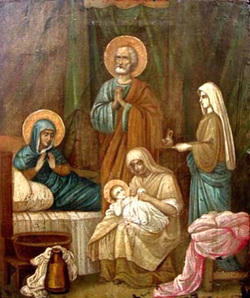
The circumstances of the Virgin Mary's infancy and early life are not directly recorded in the Bible, but other documents and traditions describing the circumstances of her birth are cited by some of the earliest Christian writers from the first centuries of the Church.
The “Protoevangelium of James,” which was probably put into its final written form in the early second century, describes Mary's father Joachim as a wealthy member of one of the Twelve Tribes of Israel. Joachim was deeply grieved, along with his wife Anne, by their childlessness. “He called to mind Abraham,” the early Christian writing says, “that in the last day God gave him a son Isaac.”
Joachim and Anne began to devote themselves extensively and rigorously to prayer and fasting, initially wondering whether their inability to conceive a child might signify God's displeasure with them.
As it turned out, however, the couple were to be blessed even more abundantly than Abraham and Sarah, as an angel revealed to Anne when he appeared to her and prophesied that all generations would honor their future child: “The Lord has heard your prayer, and you shall conceive, and shall bring forth, and your seed shall be spoken of in all the world.”
After Mary's birth, according to the Protoevangelium of James, Anne “made a sanctuary” in the infant girl's room, and “allowed nothing common or unclean” on account of the special holiness of the child. The same writing records that when she was one year old, her father “made a great feast, and invited the priests, and the scribes, and the elders, and all the people of Israel.”
“And Joachim brought the child to the priests,” the account continues, “and they blessed her, saying: 'O God of our fathers, bless this child, and give her an everlasting name to be named in all generations' . . . And he brought her to the chief priests, and they blessed her, saying: 'O God most high, look upon this child, and bless her with the utmost blessing, which shall be for ever.'”
The protoevangelium goes on to describe how Mary's parents, along with the temple priests, subsequently decided that she would be offered to God as a consecrated Virgin for the rest of her life, and enter a chaste marriage with the carpenter Joseph.
Saint Augustine described the birth of the Blessed Virgin Mary as an event of cosmic and historic significance, and an appropriate prelude to the birth of Jesus Christ. “She is the flower of the field from whom bloomed the precious lily of the valley,” he said.
The fourth-century bishop, whose theology profoundly shaped the Western Church's understanding of sin and human nature, affirmed that “through her birth, the nature inherited from our first parents is changed."
Sermon of St Augustine
Dearly beloved brethren, the day for which we have longed, the Feast-day of the Blessed and Worshipful and Always-Virgin Mary, that day is come. Let our land laugh and sing with merriment, bathed in the glory of this great Virgin's rising. She is the flower of the fields on which the priceless lily of the valleys hath blossomed. This is she whose delivery changed the nature that we draw from our first parents, and cleansed away their offence. At her that dolorous sentence which was pronounced over Eve ended its course; to her it was never said: In sorrow thou shalt bring forth children. She brought forth a Child, even the Lord, but she brought him forth, not in sorrow, but in joy.
Eve wept, but Mary laughed. Eve's womb was big with tears, but Mary's womb was big with gladness. Eve gave birth to a sinner, but Mary gave birth to the sinless One. The mother of our race brought punishment into the world, but the Mother of our Lord brought salvation into the world. Eve was the foundress of sin, but Mary was the foundress of righteousness. Eve welcomed death, but Mary helped in life. Eve smote, but Mary healed. For Eve's disobedience, Mary offered obedience; and for Eve's unbelief, Mary offered faith.
Let Mary now make a loud noise upon the organ, and between its quick notes let the rattling of the Mother's timbrel be heard. Let the gladsome choirs sing with her, and their sweet hymns mingle with the changing music. Hearken to what a song her timbrel will make accompaniment. She saith: My soul doth magnify the Lord, and my spirit hath rejoiced in God my Saviour. For he hath regarded the lowliness of his handmaiden, for, behold, from henceforth all generations shall call me blessed. For he that is Mighty hath magnified me. The new miracle of Mary's delivery hath effaced the curse of the frail backslider, and the singing of Mary hath silenced the wailing of Eve.




